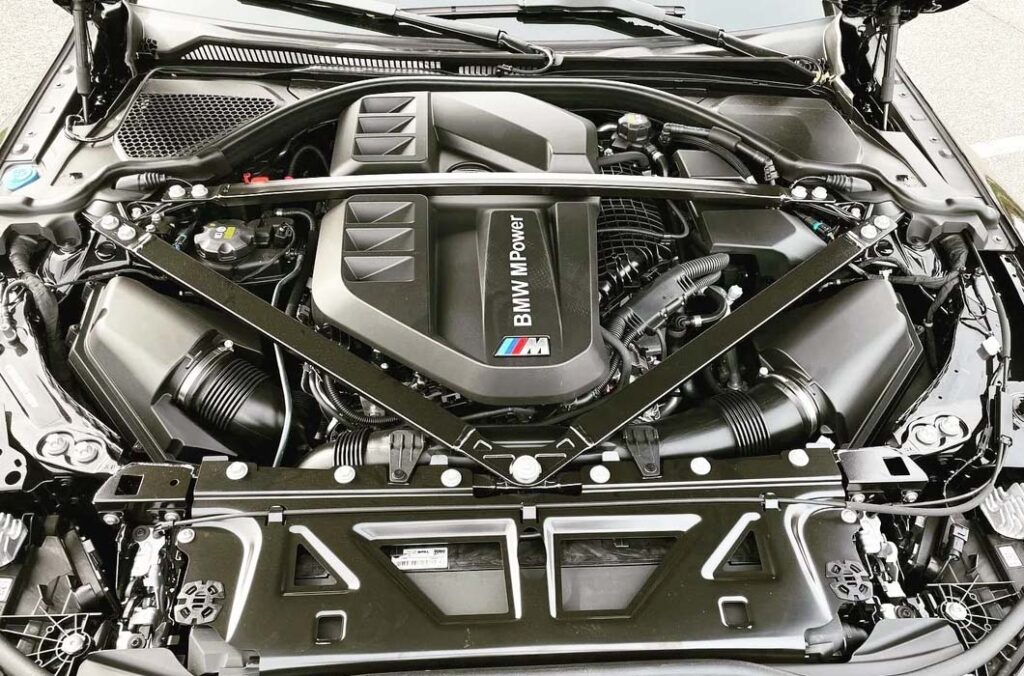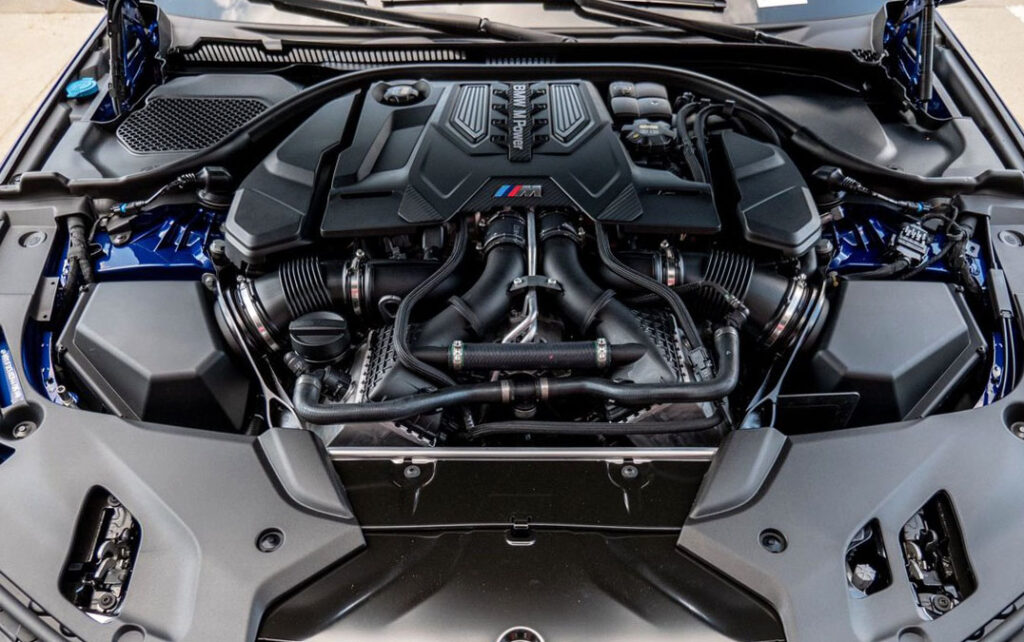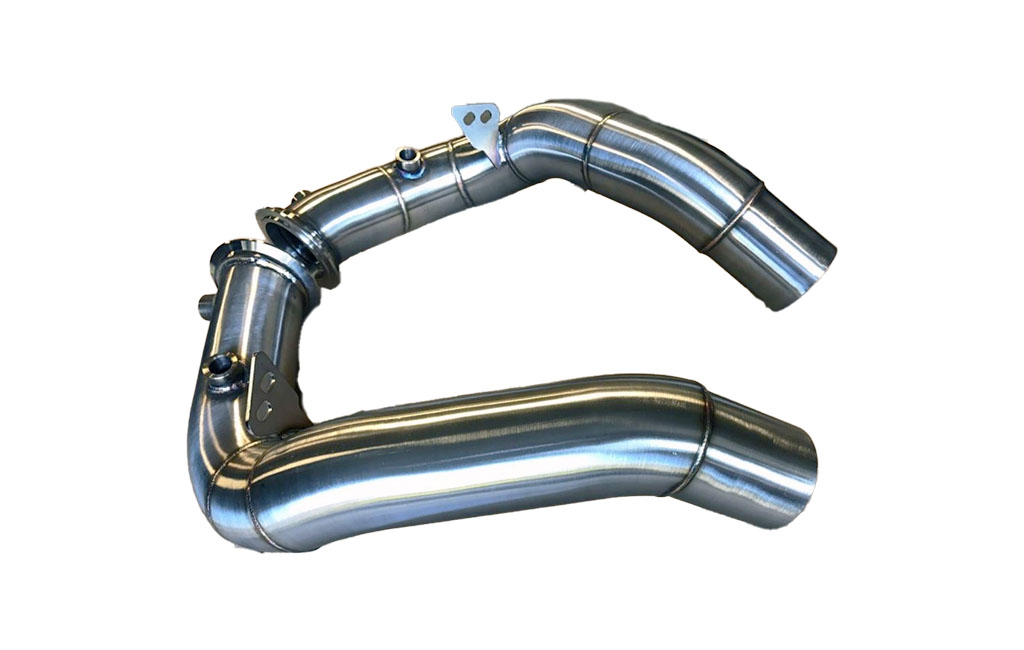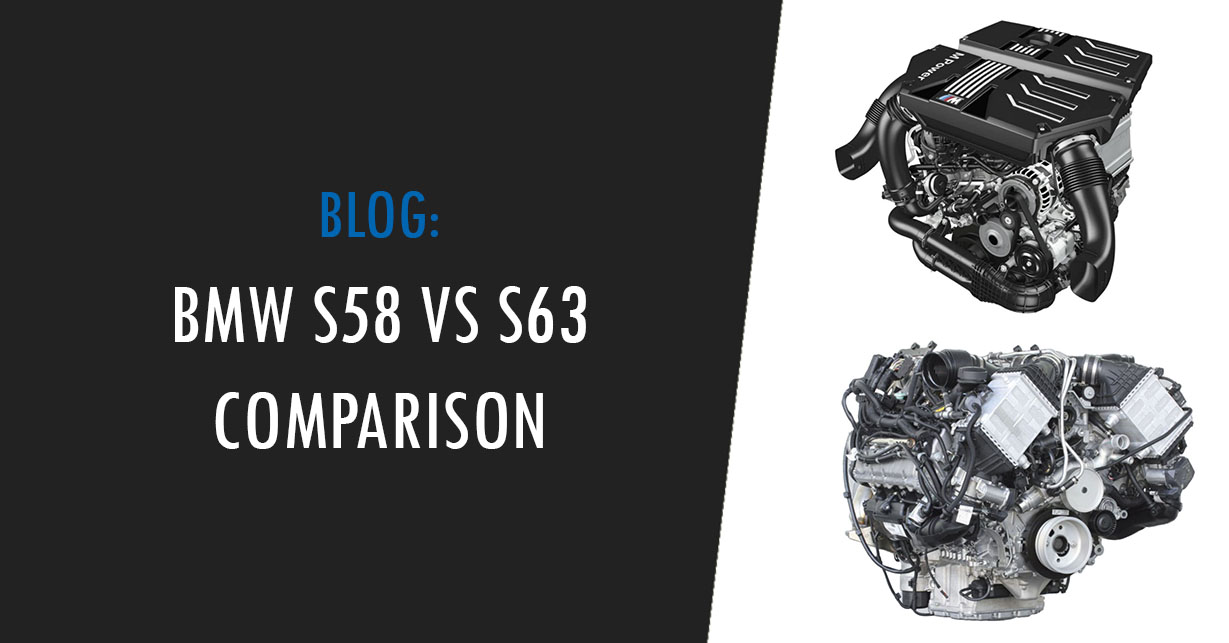Since the mid-2000s, BMW has been developing some of the best-performing turbocharged engines the automotive world has ever seen. The S58 and the S63 are the powerhouses under the hoods of the latest generation of M vehicles.
The S58 is the newest BMW twin-turbo inline-6 engine powering M cars such as the G80 M3 and it has already shown to be an incredibly capable powerplant. In comparison, the S63 debuted over a decade ago, and BMW has improved it significantly since then.
So, how do these two engines compare against each other? In this piece, we will examine the S58 vs. the S63 engines in terms of their horsepower, torque, power delivery, tuning potential, exhaust sound, and reliability.
BMW S58 vs. BMW S63 Specifications

| S58 (S58B30T0) | S63 (S63B44T3) | |
|---|---|---|
| Horsepower | 473 hp @ 6,250 rpm | 523 hp @ 5,500-6,000 rpm |
| Torque | 457 lb⋅ft @ 2,600–5,950 rpm | 553 lb⋅ft @ 1,800-4,600 rpm |
| Configuration | Twin-turbo Inline-6 | Twin-turbo V8 |
| Displacement | 3.0 L | 4.4 L |
| Compression ratio | 9.3:1 | 10:1 |
| Bore & stroke | 84 mm x 90 mm | 89 mm x 88.3 mm |
| Block material & design | Aluminum, closed deck block | Aluminum, closed deck block |
| Redline | 7,200 RPM | 7,200 RPM |
S58 vs. S63 Overview
BMW S58: even better than its predecessor
The foundation of the S58 is the BMW B58 engine, with the S58 serving as a high-performance variant that incorporates significant modifications such as an additional turbocharger, a reduced stroke, an increased bore, and larger valves for better cylinder head flow.

In terms of block construction, the S58 uses aluminum for a closed-deck block that is both strong and lightweight. Internal construction features forged chrome molybdenum heat-treated steel crankshafts, smoother bearings, and crankpins, and forged connecting rods. Pistons are also forged with anti-friction coating.
BMW S63: twin-turbo V8 monster
On the other hand, the S63 is a twin-turbo 4.4L V8 engine. It has been around for over a decade, powering “big” M cars such as the M5 and X5M. This engine has evolved over the years. Its latest iteration, the S63B44T3 is much more powerful and reliable than its original S63. At its core, it remains a twin-turbocharged 4.4L V8 with a hot-vee layout to reduce turbo lag.

The engine’s architecture includes two twin-scroll turbochargers in conjunction with a cross-engine exhaust manifold to maintain a constant flow of exhaust pulses to the turbos every 180-degree rotation of the crankshaft. The S63 engine uses air-to-water intercoolers to boost cooling and throttle response.
The S63, like the S58, is the high-performance variant of another engine, the N63. Both the S63 and N63 engines use the same aluminum-silicone alloy blocks with identical cylinder dimensions. However, a more aggressive cam profile, bigger turbos, higher redline, increased boost pressure, and improved cooling, allow the S63 to outperform the N63.
S58 vs. S63 Power & Torque
In terms of horsepower and torque, the S63 takes the crown as the more powerful of the two engines. With a peak horsepower of 523 hp at 5,500 to 6,000 RPM compared to the S58’s 474 hp at 6,250 RPM, the S63 has the upper hand.
Both engines output an ample amount of low-end torque but the S63 has an inherent advantage due to its higher displacement and V8 configuration.
From the factory, the S63 outputs more horsepower and torque.
The S58 outputs 443 lb-ft of torque while the S63 outputs a considerably higher 553 lb-ft which also comes earlier in the RPM range, making the S63 feel more powerful around the city in low-rpm scenarios.
The S58 outputs a peak torque of 443 lb-ft, whereas the S63 delivers a significantly higher peak torque of 553 lb-ft. This torque advantage of the S63 becomes particularly noticeable in low-rpm scenarios in city driving, where it feels more powerful than.
Despite the differences in power output, the straight-line speed of the M cars powered by both engines is comparable. Consider the lighter weight of S58-powered cars like the M3 against heavier S63-powered models like the M5.
BMW has made an excellent job at reducing turbo lag on both of these engines. From the factory, power delivery is close to linear making both of these engines feel almost like naturally-aspirated powerplants.
S58 vs. S63 Tuning & Mods
Both engines are highly tunable, with the S63 being the ideal choice for those looking to build a monstrous car. The S63’s larger 4.4L V8 engine can be pushed further than the comparatively small 3.0L I6. Higher displacement and a higher cylinder count can withstand heavy tuning; the limits on a stock S63 block are higher than a stock S58 block, but not by much.
The S58 is more reliable when tuned and benefits from a larger tuning community, offering an abundance of information if you have doubts about any upgrades or run into any issues.
Both engines can be tuned easily for significant power increases, but the S63 has a higher limit.

Simple mods can increase performance significantly. Catless downpipes and a tune can increase wheel horsepower (WHP) by ~150 on both platforms. Bolt-ons can take the S58 to 700 WHP while the S63 can reach 850 WHP with the same mods. Other bolt-on mods include upgraded intakes.
To unlock the maximum potential of both engines, the stock turbos will need to be replaced with bigger aftermarket units that build more boost. An S58 with upgraded turbos can top ~900 WHP while still being a usable car on the street. On the other hand, a well-tuned S63 with upgraded turbos can reach a jaw-dropping ~1100 WHP.
S58 vs. S63 Exhaust sound
The S58 and the S63 have very different exhaust notes due to one being an inline-6 and the other one a V8. The S58 exhaust outputs a raspy engine note that with the stock exhaust leaves a lot to be desired. Although it is the best-sounding twin-turbo inline 6 BMW engine to date, it doesn’t convey the same aggressiveness and growl as a turbo V8 such as the S63.
The S63 produces a perfect blend of raw V8 rumble and the distinctive sounds of two turbochargers spooling. Upshifts are magnific and downshifts sound even better. At full tilt, it is very loud with sophisticated aggressiveness.
The S63 sounds much better than the S58.
Compared to its predecessor, the S55, the S58 improves exhaust sound slightly. With the exhaust stock system, the engine note still sounds subdued and doesn’t transmit well the sheer power of the engine.
Exhaust mods such as an Akrapovic exhaust can improve exhaust sound substantially, but it still won’t match the sound of an S63 with a simple downpipe.
S58 vs. S63 Reliability
The S58 will be a more reliable engine in the long term than the S63. BMW inline-6 engines are known for being robust powerplants that can last hundreds of thousands of miles; after all, they are relatively simple engines.
On the other hand, turbocharged BMW V8s aren’t praised for their reliability, as they often require labor-intensive maintenance. The S63 is no exception.
Early S63 iterations had a fair number of issues that could cause insufficient oiling, and eventually catastrophic engine failure. The current S63 iteration (S63B44T4) has undergone a number of improvements such as oiling and cooling improvements that make it more reliable. High-mileage S63s aren’t uncommon.
The S58 is more reliable than the S63
The twin-turbo high-strung nature of the S63 can create very hot temperatures around it which degrade the oil quickly. Coolant hoses, turbo lines, and other components can fail prematurely due to the heat of the turbos as they are placed right in the middle of the engine bay. Common issues of the S63 include VANOS issues, failing ignition coils, and excessive oil consumption.
On the other hand, none of the above issues affect the S58. Complete engine failure is rare and you should expect to get hundreds of thousands of miles out of this engine as long as the oil is changed frequently and the engine isn’t pointlessly abused every time it is driven.
Conclusion: Which Engine is Better?
The answer to this question truly depends on your personal preferences and driving needs.
Do you value a compact sedan like the M3 that offers massive torque and superb handling in a compact package? Or do you lean towards a luxurious cruiser like the M5 with tons of technology and comfort with an almost limitless power supply? Are you a fan of the Inline-6 engine sound, or do you prefer the distinctive rumble of a V8?
We personally prefer the S58. The turbo inline-6 is BMWs bread and butter, and the S58 is an evolution of the already proven S55. Its exhaust sound and power delivery may not be as raw and monstrous as the S63, but it is a smooth and refined engine that it’ll cost you less in maintenance in the long run.
Both the S58 and the S63 are likely to surpass your expectations and more so if you opt for aftermarket performance modifications with a respective tune. Which engine do you prefer?
Additional resources:

